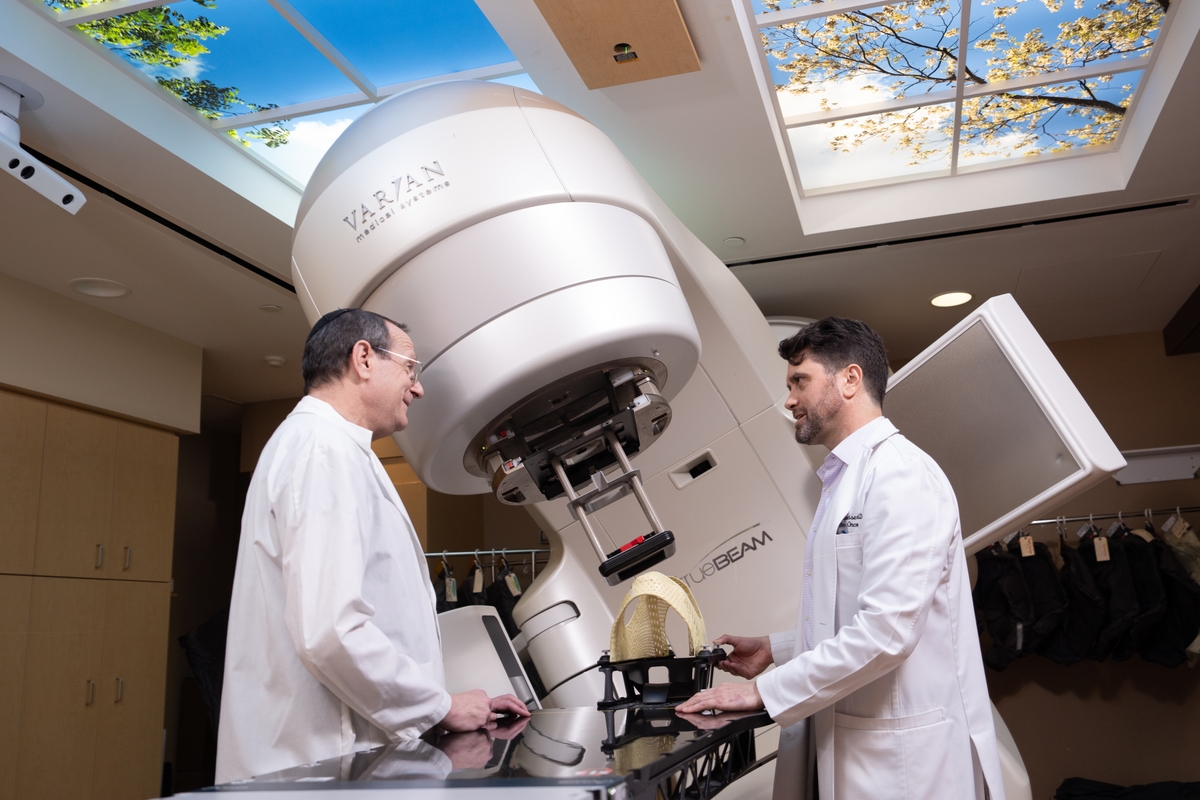Our brain cancer treatment team meets every week to review your test results, plan your treatment, and manage any other issues you may have.
We’ve organized the way we provide care so that you can see all of your doctors at the same time, during the same visit, in one convenient location. When you visit, you’ll meet with specialists from several disciplines who combine their expertise to provide you with excellent care. They include:
- Neuroradiologists, who use advanced imaging techniques to diagnose and monitor brain tumors
- Pathologists, who analyze the cellular features of your cancer to make an accurate diagnosis
- Neurosurgeons, who safely remove brain tumors
- Neuro-oncologists, who treat brain tumors using anti-cancer medications
- Radiation oncologists, who plan and deliver radiation therapy treatments
Brain Tumor Surgery
Many benign and malignant brain tumors are most effectively treated with surgery. Before or during your procedure, your surgeon may perform brain mapping. This highly innovative procedure, performed while you’re asleep or awake, maps out the functional areas of your brain. Your surgeons uses this information to plan the safest routes through your brain to remove tumor tissue while sparing healthy tissue and important functions.
Our surgeons are experienced in several types of procedures to remove brain tumors, including:
- Craniotomy: Surgeons open the scalp and skull and, guided by neuro-navigation, remove tumors from the brain. Our surgeons excel at a specialized procedure known as awake craniotomy. Patients regain consciousness at a specific point during surgery to test the brain for different functions. You would feel no pain during this procedure. This real-time feedback helps surgeons avoid healthy brain tissue during surgery.
- Endoscopic surgery (neuroendoscopy): Some brain tumors, such as pituitary tumors, are most easily accessed through the nose and sinus cavities. Using slender endoscopic equipment, skull base surgeons access brain tumors through small openings in the sinuses, without any external incisions.
- Fluorescence-guided neurosurgery: Englewood Health surgeons were the first in New Jersey to perform fluorescence-guided brain surgery. Before surgery, you ingest an oral fluorescent compound which causes brain tumor cells to light up under a microscope. This technique helps surgeons better visualize brain tumors during surgery, preserving healthy brain tissue while removing cancerous cells.
- Minimally invasive neurosurgery: In some cases, minimally invasive surgery allows surgeons to safely remove tumors through a single tiny incision. For some tumors, the doctor may recommend keyhole surgery, which hides a small incision in the eyebrow. Your surgeon will let you know if minimally invasive brain tumor surgery is an option for you.
Radiotherapy for Brain Cancer
Englewood Health offers stereotactic radiosurgery (SRS) and stereotactic body radiation therapy (SBRT) to treat brain tumors with high-dose pinpoint radiation. Our doctors use the Varian TrueBeam® radiotherapy system. This advanced technology helps us deliver the most precise treatment possible. With extreme accuracy, we can target the tumor and protect normal tissues from harm during treatment. It is not unusual to need only a single dose, making your treatment more convenient.

Medical Treatments for Brain Cancer
Some people with brain cancer take anti-cancer medications designed to inhibit cancer growth. Our Infusion Center, located on the Englewood Health campus, offers a comfortable and convenient experience for patients returning often for therapy. We also offer medical treatments for brain cancer at our Jersey City and Fair Lawn locations. Medical treatments for brain cancer include:
- Chemotherapy: Some anti-cancer drugs (such as temozolomide) are taken orally (by mouth), while others are given intravenously (by vein). Doctors continue to evaluate new drugs for brain cancer in clinical trials.
- Hormone therapy: For tumors affecting the pituitary gland, doctors prescribe hormone therapy to regulate hormone production.
- Other medications: You may receive other drugs to manage symptoms, side effects of treatment, or other issues.
Geriatric Oncology for Brain Cancer
At Englewood Health, we offer specialized care for older adults diagnosed with brain cancer. Our team focuses on the unique needs of elderly patients, tailoring treatment plans to address both the cancer and any age-related health concerns. With a comprehensive approach that balances effective cancer treatment and maintaining quality of life, we provide personalized care that takes into account the patient's overall well-being and treatment tolerability.
Clinical Trials
For patients with aggressive brain cancers such as glioblastoma, clinical trials of investigational therapies often offer the most hope. Our oncologists participate in clinical trials evaluating promising new treatment options for brain cancer. A clinical trial may give you access to a cutting-edge therapy that is not yet available as a standard treatment. Your care team will let you know if you may be eligible for any clinical trials. The decision to participate is entirely yours.
Survivorship Services
After completing multidisciplinary therapy, patients are guided through a comprehensive survivorship meeting. This meeting provides an opportunity to review the treatments received and establish a personalized plan for ongoing surveillance and follow-up care. Our team will assess your current health status, discuss strategies for monitoring your recovery, and help ensure you have the necessary support for long-term well-being following brain cancer treatment.